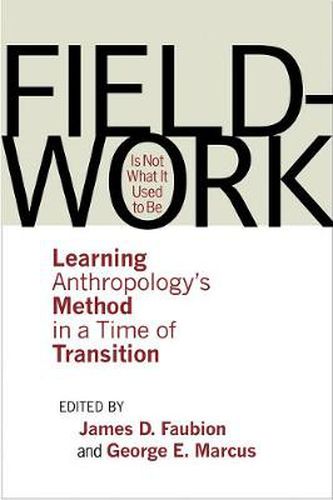Readings Newsletter
Become a Readings Member to make your shopping experience even easier.
Sign in or sign up for free!
You’re not far away from qualifying for FREE standard shipping within Australia
You’ve qualified for FREE standard shipping within Australia
The cart is loading…






Over the past two decades anthropologists have been challenged to rethink the nature of ethnographic research, the meaning of fieldwork, and the role of ethnographers. Ethnographic fieldwork has cultural, social, and political ramifications that have been much discussed and acted upon, but the training of ethnographers still follows a very traditional pattern; this volume engages and takes its point of departure in the experiences of ethnographers-in-the-making that encourage alternative models for professional training in fieldwork and its intellectual contexts.
The work done by contributors to Fieldwork Is Not What It Used to Be articulates, at the strategic point of career-making research, features of this transformation in progress. Setting aside traditional anxieties about ethnographic authority, the authors revisit fieldwork with fresh initiative. In search of better understandings of the contemporary research process itself, they assess the current terms of the engagement of fieldworkers with their subjects, address the constructive, open-ended forms by which the conclusions of fieldwork might take shape, and offer an accurate and useful description of what it means to become-and to be-an anthropologist today.
Contributors: Lisa Breglia, George Mason University; Jae A. Chung, Aalen University; James D. Faubion, Rice University; Michael M. J. Fischer, MIT; Kim Fortun, Rensselaer Polytechnic Institute; Jennifer A. Hamilton, Hampshire College; Christopher M. Kelty, UCLA; George E. Marcus, University of California, Irvine; Nahal Naficy, Rice University; Kristin Peterson, University of California, Irvine; Deepa S. Reddy, University of Houston-Clear Lake
$9.00 standard shipping within Australia
FREE standard shipping within Australia for orders over $100.00
Express & International shipping calculated at checkout
Over the past two decades anthropologists have been challenged to rethink the nature of ethnographic research, the meaning of fieldwork, and the role of ethnographers. Ethnographic fieldwork has cultural, social, and political ramifications that have been much discussed and acted upon, but the training of ethnographers still follows a very traditional pattern; this volume engages and takes its point of departure in the experiences of ethnographers-in-the-making that encourage alternative models for professional training in fieldwork and its intellectual contexts.
The work done by contributors to Fieldwork Is Not What It Used to Be articulates, at the strategic point of career-making research, features of this transformation in progress. Setting aside traditional anxieties about ethnographic authority, the authors revisit fieldwork with fresh initiative. In search of better understandings of the contemporary research process itself, they assess the current terms of the engagement of fieldworkers with their subjects, address the constructive, open-ended forms by which the conclusions of fieldwork might take shape, and offer an accurate and useful description of what it means to become-and to be-an anthropologist today.
Contributors: Lisa Breglia, George Mason University; Jae A. Chung, Aalen University; James D. Faubion, Rice University; Michael M. J. Fischer, MIT; Kim Fortun, Rensselaer Polytechnic Institute; Jennifer A. Hamilton, Hampshire College; Christopher M. Kelty, UCLA; George E. Marcus, University of California, Irvine; Nahal Naficy, Rice University; Kristin Peterson, University of California, Irvine; Deepa S. Reddy, University of Houston-Clear Lake